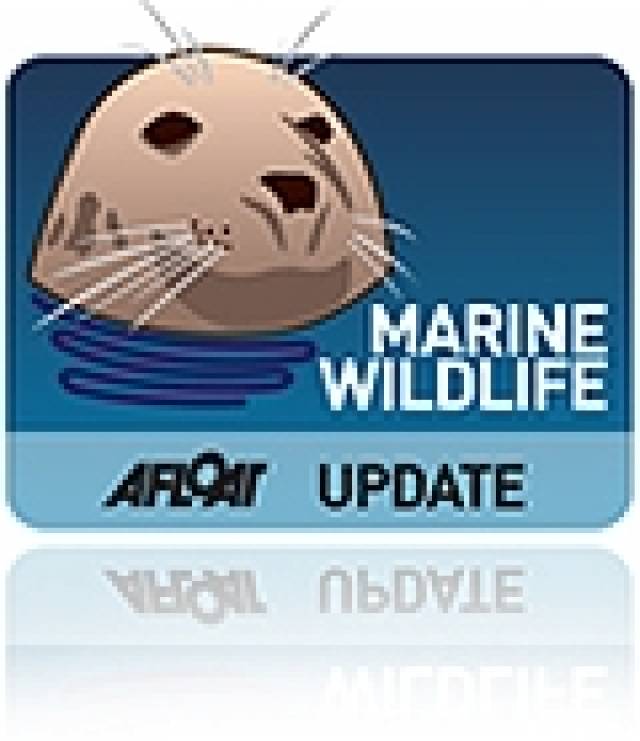Mr. Sean Connick, T.D., Minister of State at the Department of Agriculture, Fisheries and Food, today (June 29th) launched a milestone report on the effects of climate change on Ireland’s marine ecosystems. The document - Irish Ocean Climate and Ecosystem Status Report 2009 – details a number of significant observations recorded in recent years including: increases in sea surface temperature, increased wave heights off the south west coast and an increase in the number of warm water species in Irish waters, ranging from microscopic plankton to swarms of jellyfish. This report is one of three projects funded as part of the Marine NDP Research Programme (Sea Change) under the Environmental Policy Research Measure.
“It could be argued that one of the greatest challenges our marine food industries - such as fishing and aquaculture - are the effects of marine climate change,” said Minister Connick. “These changes will be primarily driven by the Atlantic Ocean. Research is therefore urgently required to improve our capability to predict marine climate change so that we can preempt and deal with the economic, social, political and environmental consequences that might follow.”
One key finding of the report is that increases of sea surface temperature of 0.6°C per decade have been taking place since 1994, which are unprecedented in the past 150 years. This in turn is linked to an increase in microscopic plants and animals, along with species of jellyfish. Further up the food chain, increased numbers of most warm water fish species have been observed in Irish waters, along with sightings of exotic species such as snake pipefish. Declines in number of seabirds have also been observed which may have a climate link.
“Ireland is strategically placed to play a key role in monitoring ocean-induced changes in our climate and environment,” said Dr. Peter Heffernan, CEO of the Marine Institute. “Geographically the warm southern waters of the Atlantic drift come closer to Ireland than any other country in Europe, where they merge with the cooler northern waters off the coasts of Galway and Mayo. It is here that the predicted biological shifts in marine species diversity or abundance are most likely to occur, making Ireland an ideal laboratory for the study of marine climate change.”
In the long term, the Irish Ocean Climate and Ecosystem Status Report 2009 report predicts that global mean sea level may rise by up to 0.88 m by 2100. This, when combined with the increase in wave heights of 0.8 m that have already been observed off southwest Ireland, could lead to an increased threat of coastal erosion and flooding.
‘We assembled a team who extensively reviewed and analysed our extensive marine databanks on oceanography, plankton and productivity, marine fisheries and migratory species such as salmon, trout and eels with the specific aim of identifying any pattern that might be linked to climate change,” said Dr. Glenn Nolan of the Marine Institute who managed the team. “In some instances these data were painstakingly assembled over a considerable period of time, indeed one of the time series extends back over five decades.”
A second report which reviews the effect of ocean acidification in Irish waters “Ocean Acidification: An Emerging Threat to our Marine Environment - 2010” has also been completed which highlights the growing threat to marine life and fragile ecosystems around the coast as a direct consequence of increased carbon dioxide (CO2) levels in the atmosphere. The report recommends that a nationally coordinated multidisciplinary marine climate change and ecosystem monitoring programme be established that will enable better evaluations to be made of the threats posed to the marine environment and economy by ocean acidification. It emphasises closer links between climate change, ocean acidification and environmental policy development especially in relation to mitigation strategies to reduce carbon emissions.
Sea Change – A Marine Knowledge, Research & Innovation Strategy for Ireland, identified climate change as a priority area for research over the period 2007 to 2013 and this report represents a significant contribution towards achieving the objectives of the marine research programme. It addresses the need to increase our understanding of the drivers and regulators of climate so as to improve the accuracy of advice to Government while at the same time provide key inputs into the national climate change programme of the EPA. It will also improve the reliability of predictive models, and allow researchers to downscale global climate model predictions to the regional/local scale. As an island nation, it is important to continue to support investment in marine climate change research. This in turn will strengthen Ireland’s ability to develop knowledge-based scenarios on climate change impacts on the various marine sectors and include these in all future social, economic and environmental strategies.
The complete Irish Ocean Climate and Ecosystem Status Report 2009 and Report summary are downloadable from:
http://www.marine.ie/NR/rdonlyres/E581708D-6269-4941-836F-6B012DD7A4BD/0/IrishOceanClimateandEcosystemStatusReport2009.pdf
http://www.marine.ie/NR/rdonlyres/7528902D-2467-4F3E-BF21-39D81AEA4D37/0/SummaryIrishOceanClimateandEcosystemStatusReport2009.pdf
The Ocean Acidification Report can be downloaded from:
http://www.marine.ie/home/publicationsdata/publications/Marine+Foresight+Publications.htm
































































